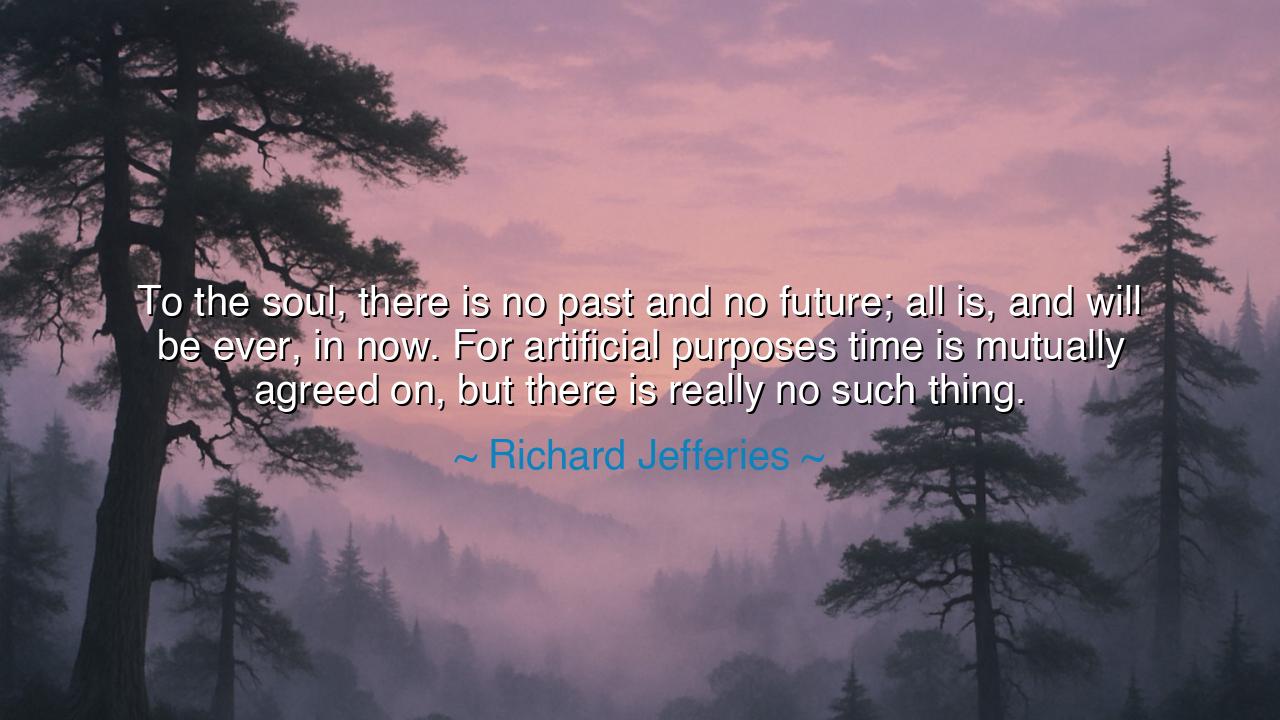
To the soul, there is no past and no future; all is, and will be
To the soul, there is no past and no future; all is, and will be ever, in now. For artificial purposes time is mutually agreed on, but there is really no such thing.






"To the soul, there is no past and no future; all is, and will be ever, in now. For artificial purposes, time is mutually agreed on, but there is really no such thing." These profound words by Richard Jefferies invite us to reflect on the nature of time, existence, and the relationship between the mind and the soul. Jefferies suggests that the soul, in its purest and most authentic form, operates outside the constraints of linear time. It does not recognize the past or the future, but exists fully in the present moment—the eternal now. Time, in this view, is a construct of the material world, something we agree upon for practical purposes, but not an inherent reality in the realm of the soul.
In the ancient wisdom of the Greeks, particularly in the teachings of Heraclitus, we find a similar understanding of time as an ever-flowing, dynamic process. Heraclitus famously said, "You cannot step into the same river twice," highlighting the idea that time is constantly moving, and the present moment is always changing. However, unlike Heraclitus, Jefferies takes this a step further by suggesting that the soul is not subject to the flow of time at all—it exists beyond time, in a state of timelessness. The soul, as Jefferies implies, does not dwell on what has passed or what is to come. It abides in the now, where all possibilities and realities converge.
This ancient concept is mirrored in the teachings of Buddhism, where nirvana—the ultimate goal of enlightenment—is often described as a state of eternal presence. In the Buddhist view, the cycle of samsara—the cycle of birth, life, death, and rebirth—is driven by attachment to time and the illusion of past and future. The enlightened mind, however, transcends these attachments and experiences reality in its purest form, which is the now. The present moment is all that truly exists, and everything else is but a projection of the mind. Jefferies’ words align closely with this wisdom, encouraging us to release the grip of the past and future and embrace the eternal now, where the soul finds its true peace.
Consider the story of Siddhartha Gautama, known as the Buddha, who, upon seeking enlightenment, chose to sit beneath the Bodhi tree, refusing to move until he attained full understanding. In that moment of intense presence, the Buddha transcended the distractions of the past and the anxieties of the future. He entered into the timeless realm of the present moment and achieved nirvana. The Buddha’s story exemplifies the idea that the soul, when freed from the limitations of time, achieves clarity and peace—an experience of eternal truth that exists beyond the fleeting moments of daily life.
Jefferies' reflection also echoes the Stoic teachings of Epictetus, who believed that the only thing we truly control is our response to the present moment. In his Discourses, Epictetus taught that we should not dwell on the past, nor worry about the future, for both are beyond our control. The Stoic philosophy places great emphasis on accepting the present and responding to it with wisdom and virtue. The soul, in the Stoic sense, is most aligned with nature when it lives fully in the present moment, undistracted by time’s passing. Marcus Aurelius, in his Meditations, echoes this idea, urging us to act according to reason in the now, for that is where our true power lies.
The lesson here is profound: we are often prisoners of time, bound by the past and the future—in our memories and our anticipations. Yet, as Jefferies and the ancient philosophers teach, the true freedom of the soul lies in releasing our attachment to time and living fully in the now. Time, while useful in navigating the practical world, is a mental construct. The past, as much as we might cherish it, is gone, and the future, while full of possibilities, remains unwritten. It is the present moment that is the only true reality, and it is in this moment that we can find the deepest peace and clarity.
In practical terms, we can apply Jefferies’ wisdom by practicing mindfulness—an awareness of the present moment without attachment to the past or the future. When we engage fully with the now, we release the burdens of regret and the anxieties of what is to come. We cultivate a life that is rich with experience, untainted by the distractions of time. Whether through meditation, contemplation, or simply being present in our daily activities, we can bring our minds and souls into harmony with the eternal now. Let us remember that the soul knows no time; it exists in the eternal present, where all that truly matters is the moment we are living right now.






AAdministratorAdministrator
Welcome, honored guests. Please leave a comment, we will respond soon